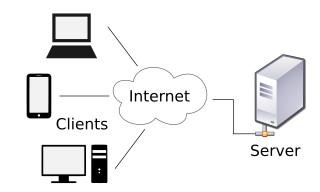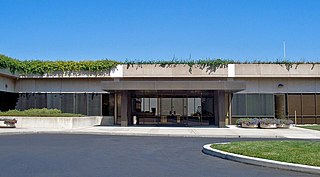Related Research Articles

Alan Curtis Kay is an American computer scientist best known for his pioneering work on object-oriented programming and windowing graphical user interface (GUI) design. At Xerox PARC he led the design and development of the first modern windowed computer desktop interface. There he also led the development of the influential object-oriented programming language Smalltalk, both personally designing most of the early versions of the language and coining the term "object-oriented." He has been elected a Fellow of the American Academy of Arts and Sciences, the National Academy of Engineering, and the Royal Society of Arts. He received the Turing award in 2003.

Claude Elwood Shannon was an American mathematician, electrical engineer, computer scientist and cryptographer known as the "father of information theory".

The client–server model is a distributed application structure that partitions tasks or workloads between the providers of a resource or service, called servers, and service requesters, called clients. Often clients and servers communicate over a computer network on separate hardware, but both client and server may reside in the same system. A server host runs one or more server programs, which share their resources with clients. A client usually does not share any of its resources, but it requests content or service from a server. Clients, therefore, initiate communication sessions with servers, which await incoming requests. Examples of computer applications that use the client–server model are email, network printing, and the World Wide Web.

PARC is a research and development company in Palo Alto, California. Founded in 1969 by Jacob E. "Jack" Goldman, chief scientist of Xerox Corporation, the company was originally a division of Xerox, tasked with creating computer technology-related products and hardware systems.

A document is a written, drawn, presented, or memorialized representation of thought, often the manifestation of non-fictional, as well as fictional, content. The word originates from the Latin Documentum, which denotes a "teaching" or "lesson": the verb doceō denotes "to teach". In the past, the word was usually used to denote written proof useful as evidence of a truth or fact. In the Computer Age, "document" usually denotes a primarily textual computer file, including its structure and format, e.g. fonts, colors, and images. Contemporarily, "document" is not defined by its transmission medium, e.g., paper, given the existence of electronic documents. "Documentation" is distinct because it has more denotations than "document". Documents are also distinguished from "realia", which are three-dimensional objects that would otherwise satisfy the definition of "document" because they memorialize or represent thought; documents are considered more as 2-dimensional representations. While documents can have large varieties of customization, all documents can be shared freely and have the right to do so, creativity can be represented by documents, also. History, events, examples, opinions, etc. all can be expressed in documents.
Information overload is the difficulty in understanding an issue and effectively making decisions when one has too much information (TMI) about that issue, and is generally associated with the excessive quantity of daily information. The term "information overload" was first used as early as 1962 by scholars in management and information studies, including in Bertram Gross' 1964 book, The Managing of Organizations, and was further popularized by Alvin Toffler in his bestselling 1970 book Future Shock. Speier et al. (1999) said that if input exceeds the processing capacity, information overload occurs, which is likely to reduce the quality of the decisions.

Robert William Taylor, known as Bob Taylor, was an American Internet pioneer, who led teams that made major contributions to the personal computer, and other related technologies. He was director of ARPA's Information Processing Techniques Office from 1965 through 1969, founder and later manager of Xerox PARC's Computer Science Laboratory from 1970 through 1983, and founder and manager of Digital Equipment Corporation's Systems Research Center until 1996.

Barry Wellman is a Canadian-American sociologist and is the co-director of the Toronto-based international NetLab Network. His areas of research are community sociology, the Internet, human-computer interaction and social structure, as manifested in social networks in communities and organizations. His overarching interest is in the paradigm shift from group-centered relations to networked individualism. He has written or co-authored more than 300 articles, chapters, reports and books. Wellman was a professor at the Department of Sociology, University of Toronto for 46 years, from 1967 to 2013, including a five-year stint as S.D. Clark Professor.
Computer ethics is a part of practical philosophy concerned with how computing professionals should make decisions regarding professional and social conduct.
Children's culture includes children's cultural artifacts, children's media and literature, and the myths and discourses spun around the notion of childhood. Children's culture has been studied within academia in cultural studies, media studies, and literature departments. The interdisciplinary focus of childhood studies could also be considered in the paradigm of social theory concerning the study of children's culture.

Pierre Lévy is a Tunisian-born French philosopher, cultural theorist and media scholar who specializes in the understanding of the cultural and cognitive implications of digital technologies and the phenomenon of human collective intelligence.
K. A. (Kim) Taipale is an investor, legal scholar, and social theorist specializing in information, technology, and national security policy. He is a partner in Stilwell Holding, a private investment firm, and the former chairman of the executive committee of Kobra International Ltd. He is also the founder and executive director of the Stilwell Center for Advanced Studies in Science and Technology Policy, a private, nonpartisan research organization, and a director of the Stilwell Charitable Fund. He was previously an investment banker at Lazard Freres & Co. and a lawyer at Davis Polk & Wardwell.

danah boyd is a technology and social media scholar. She is a partner researcher at Microsoft Research, the founder of Data & Society Research Institute, and a distinguished visiting professor at Georgetown University.
Social information processing is "an activity through which collective human actions organize knowledge." It is the creation and processing of information by a group of people. As an academic field Social Information Processing studies the information processing power of networked social systems.
Steve Whittaker is a Professor in Human-Computer Interaction at the University of California Santa Cruz. He is best known for his research at the intersection of computer science and social science in particular on computer mediated communication and personal information management. He is a Fellow of the ACM, and winner of the CSCW 2018 "Lasting Impact" award. He also received a Lifetime Research Achievement Award from SIGCHI, is a Member of the SIGCHI Academy. He is Editor of the journal Human Computer Interaction..
Anne Marie Balsamo is a writer who focuses on the connections between art, culture, gender, and technology.

A digital detox is a period of time when a person voluntarily refrains from using digital devices such as smartphones, computers, and social media platforms. This form of detoxification has gained popularity, as individuals have increased their time spent on digital devices and the Internet.
Robert Wilensky was an American computer scientist and emeritus professor at the UC Berkeley School of Information, with his main focus of research in artificial intelligence.
References
- ↑ Harden, Blaine. (May 10, 2004). Unplugging the Addiction To Information Overload. The Washington Post. (subscription required)
- ↑ https://www.nytimes.com/1971/06/14/archives/top-dartmouth-graduate-voices-despair.html
- ↑ Crawley, Charles R. (May 3, 2003). Scrolling Forward: Making Sense of Documents in the Digital Age. Technical Communication. Society for Technical Communication. (subscription required)
- ↑ David M. Levy. UW Information School.